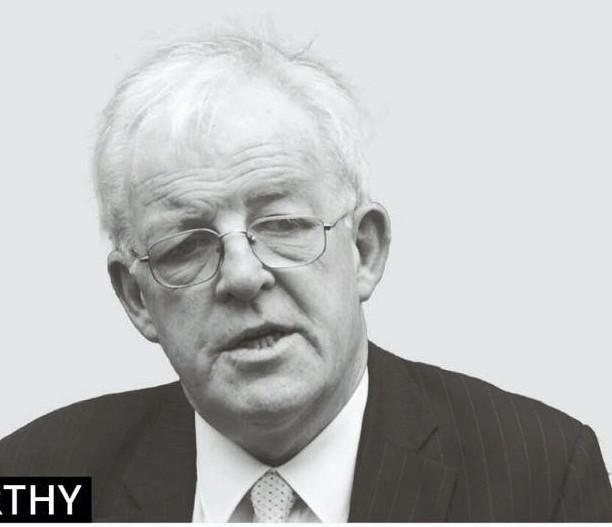The Irish Banking Culture Board (IBCB) was established in April 2019, with a purpose to work closely with member banks to build trustworthiness in order to assist the industry in regaining public trust.
It is an independent industry initiative, fully funded by five retail banks in Ireland – AIB, Bank of Ireland, KBC Bank, Permanent TSB and Ulster Bank. The IBCB requires all participating banks to improve culture, customer outcomes and competence.
It promotes ethical behaviour and advocates for humanity, decency and respect in the banking sector.
The IBCB is comprised of 14 directors, with the majority being non-bank.
Three directors represent the interests of consumers, two others represent other bank customers – small and medium enterprises (SMEs) and Limerick dairy farmer Martin Stapleton, treasurer of the IFA represents farmers.
Guide to a basic bank account
The IBCB recently launched a Guide to a Basic Bank Account supporting financial inclusion and access to banking, and announced their partnership with Safe Ireland for financial literacy for people impacted by domestic violence.
This provides essential guidance for customers, in particular, customers in vulnerable positions, to apply for a bank account to support their inclusion and accessibility to banking in Ireland.
The guide has been translated into many languages, removing language as a barrier to many who are seeking to apply for a basic bank account
A basic bank account is a current account that provides essential daily banking services, which all residents of the EU have the right to, no matter what their financial situation.
From the IBCB’s own research undertaken in 2020, it became clear there was a need to raise awareness of the basic bank account, as a first step towards financial inclusion across society.
The guide has been translated into many languages, removing language as a barrier to many who are seeking to apply for a basic bank account. All retail banks in Ireland will provide a basic bank account with the same core features, receiving money, making payments, making lodgements and withdrawals, and a debit card.
Safe Ireland broadly welcomes the guide
Board member of the IBCB and former chief executive of the Citizens Information Board Angela Black said: “Banks have listened and are responding to the needs of those who found opening a bank account challenging, due to their specific personal circumstances.”
CEO of Safe Ireland, Mary McDermott, said: “Safe Ireland broadly welcomes the guide. Central to intimate coercion and the use of violence is the desire to access and control finance.
“This guide is a very clear support for people who find themselves locked out from financial literacy training.”
Recent Central Bank review
A Central Bank (CB) review has found unacceptable delays in waiting times on some customer support lines across the five main retail banks here. In some cases, the research found that customers had to wait up to two hours to have their calls answered.
The banks concerned had exceeded their Service Level Agreements (SLA), on the average call wait times.
The data produced measured daily call volumes, average call wait times, call abandonment rates, and included adherence with internal service level standards and resource levels. The assessment was carried out on AIB, Bank of Ireland, Ulster Bank, Permanent TSB and KBC Bank.
Call abandonment was found to be high, with the review finding that on one phone line, 50% of the calls were ended by customers before they were even answered.
It was found that the level of resourcing for customer service lines varied considerably across the banks, and was insufficient in some cases.
The CB has now instructed the five banks concerned to implement robust action plans to tackle the problems that have been identified.
Director of consumer protection at the CB Colm Kincaid said: “With the planned departures of KBC Bank and Ulster Bank, it is expected that the demand for customer services will hugely increase across the banking sector, so this is even more important as customers look to move accounts, access new services and seek information.”
He went on to say: “It is the responsibility of banks to ensure that they have sufficient resources in place to help consumers navigate this significant change in our banking market, including meeting demand from both existing and new customers.”
The banks now have until year end, to report on their implementation of the measures agreed with the CB.
Last June, the CB wrote to the retail banks, and outlined its expectations about how they should handle the impact on customers of the exit of Ulster Bank and KBC Bank.
These included demonstrating a customer-focused culture, being transparent and clear in communications, and giving customers as much notice as possible about account closures and product withdrawals.
Ulster Bank update
In mid-February, Ulster Bank said it will shortly begin to contact customers who will need to start the process of choosing a new bank, moving their banking and closing their existing account.
The bank outlined the measures it has put in place to help vulnerable customers, such as a dedicated customer phone line (1800-656 001 open 8am to 8pm, seven days per week), extra staffing in their vulnerable customer unit, financial abuse support, training of branch staff and translation services.
Read more
Money Mentor: operating a small business through a pandemic takes courage
Money Mentor: tax, mental health and inheriting a house
The Irish Banking Culture Board (IBCB) was established in April 2019, with a purpose to work closely with member banks to build trustworthiness in order to assist the industry in regaining public trust.
It is an independent industry initiative, fully funded by five retail banks in Ireland – AIB, Bank of Ireland, KBC Bank, Permanent TSB and Ulster Bank. The IBCB requires all participating banks to improve culture, customer outcomes and competence.
It promotes ethical behaviour and advocates for humanity, decency and respect in the banking sector.
The IBCB is comprised of 14 directors, with the majority being non-bank.
Three directors represent the interests of consumers, two others represent other bank customers – small and medium enterprises (SMEs) and Limerick dairy farmer Martin Stapleton, treasurer of the IFA represents farmers.
Guide to a basic bank account
The IBCB recently launched a Guide to a Basic Bank Account supporting financial inclusion and access to banking, and announced their partnership with Safe Ireland for financial literacy for people impacted by domestic violence.
This provides essential guidance for customers, in particular, customers in vulnerable positions, to apply for a bank account to support their inclusion and accessibility to banking in Ireland.
The guide has been translated into many languages, removing language as a barrier to many who are seeking to apply for a basic bank account
A basic bank account is a current account that provides essential daily banking services, which all residents of the EU have the right to, no matter what their financial situation.
From the IBCB’s own research undertaken in 2020, it became clear there was a need to raise awareness of the basic bank account, as a first step towards financial inclusion across society.
The guide has been translated into many languages, removing language as a barrier to many who are seeking to apply for a basic bank account. All retail banks in Ireland will provide a basic bank account with the same core features, receiving money, making payments, making lodgements and withdrawals, and a debit card.
Safe Ireland broadly welcomes the guide
Board member of the IBCB and former chief executive of the Citizens Information Board Angela Black said: “Banks have listened and are responding to the needs of those who found opening a bank account challenging, due to their specific personal circumstances.”
CEO of Safe Ireland, Mary McDermott, said: “Safe Ireland broadly welcomes the guide. Central to intimate coercion and the use of violence is the desire to access and control finance.
“This guide is a very clear support for people who find themselves locked out from financial literacy training.”
Recent Central Bank review
A Central Bank (CB) review has found unacceptable delays in waiting times on some customer support lines across the five main retail banks here. In some cases, the research found that customers had to wait up to two hours to have their calls answered.
The banks concerned had exceeded their Service Level Agreements (SLA), on the average call wait times.
The data produced measured daily call volumes, average call wait times, call abandonment rates, and included adherence with internal service level standards and resource levels. The assessment was carried out on AIB, Bank of Ireland, Ulster Bank, Permanent TSB and KBC Bank.
Call abandonment was found to be high, with the review finding that on one phone line, 50% of the calls were ended by customers before they were even answered.
It was found that the level of resourcing for customer service lines varied considerably across the banks, and was insufficient in some cases.
The CB has now instructed the five banks concerned to implement robust action plans to tackle the problems that have been identified.
Director of consumer protection at the CB Colm Kincaid said: “With the planned departures of KBC Bank and Ulster Bank, it is expected that the demand for customer services will hugely increase across the banking sector, so this is even more important as customers look to move accounts, access new services and seek information.”
He went on to say: “It is the responsibility of banks to ensure that they have sufficient resources in place to help consumers navigate this significant change in our banking market, including meeting demand from both existing and new customers.”
The banks now have until year end, to report on their implementation of the measures agreed with the CB.
Last June, the CB wrote to the retail banks, and outlined its expectations about how they should handle the impact on customers of the exit of Ulster Bank and KBC Bank.
These included demonstrating a customer-focused culture, being transparent and clear in communications, and giving customers as much notice as possible about account closures and product withdrawals.
Ulster Bank update
In mid-February, Ulster Bank said it will shortly begin to contact customers who will need to start the process of choosing a new bank, moving their banking and closing their existing account.
The bank outlined the measures it has put in place to help vulnerable customers, such as a dedicated customer phone line (1800-656 001 open 8am to 8pm, seven days per week), extra staffing in their vulnerable customer unit, financial abuse support, training of branch staff and translation services.
Read more
Money Mentor: operating a small business through a pandemic takes courage
Money Mentor: tax, mental health and inheriting a house










SHARING OPTIONS